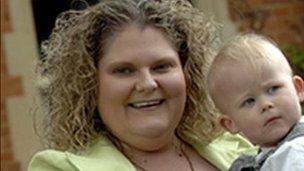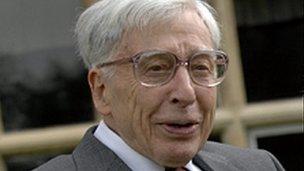'Test-tube baby' Brown hails pioneers on 35th birthday
- Published

Louise Brown is now married and has a son
The world's first "test-tube baby", Louise Brown, has paid tribute to the fertility doctors who gave her life, as she celebrates her 35th birthday.
She said in vitro fertilisation had helped millions - there are thought to be more than 5.5 million IVF babies worldwide.
She was born in 1978 at Oldham General Hospital after her parents became the first to successfully undergo IVF.
Mrs Brown is now married and has a six-year-old son, who was born naturally.
As she prepared to celebrate her birthday with a private family meal, Mrs Brown said she hoped the public could now see the benefits of the breakthrough.
"When I was born they all said it shouldn't be done and that it was messing with God and nature but it worked and obviously it was meant to be," she added.
"It's helped millions all around the world and if it can help improve success rates, obviously it's a good thing.
"I've now had my own son without IVF and lots of people I know or have heard of have gone on to have children naturally.
"That shows that it is just the beginning of life that's a little bit different, the rest is just the same."
Her birth, to parents Lesley and John, attracted controversy at the time. Religious leaders expressed concern over the use of artificial intervention and some raised fears that science was creating babies who could experience medical difficulties later in life.
Mrs Brown, whose younger sister Natalie was also the product of IVF, now lives near Bristol. She is married and has a six-year-old son, Cameron.
She recently unveiled a plaque to honour IVF pioneers gynaecologist Patrick Steptoe and reproductive biologist Robert Edwards at Bourn Hall, the clinic they founded in Cambridge and where the techniques and drugs now used worldwide were first developed.
Their research led to the successful fertilisation of a human egg outside the body and the transfer of the resulting embryo to the womb.
Sir Robert, who was awarded a Nobel Prize in 2010, died aged 87 in April this year. Steptoe died in 1988.

Sir Robert Edwards was the physiologist who developed the IVF technique that gave birth to Louise Brown
Mrs Brown spoke of her sadness at the death of Sir Robert - who was married with five daughters.
She added that she remembered Steptoe as a "gentle giant".
"Without Patrick and Bob's help, Mum wouldn't have had me," she said.
"As I got older, Mum explained to me how they had both helped.
"Bob was like a granddad to me and I felt very, very sad to hear of his death.
"He was so well liked and so many people owe so much to his work."
She called for IVF to be made more readily available and said more people should have access to it on the NHS.
"It is difficult to say what it is like to be the first test-tube baby as I have been brought up with it. People ask what it feels like, but it's just always been there - it's my life," she added.
"I understand more now and I just think my mum was fantastic.
"I think she was just very brave but I suppose if you're told you can't have children, you'll do anything."
- Published10 April 2013
- Published10 April 2013
- Published10 December 2010
- Published11 June 2011
- Published4 October 2010